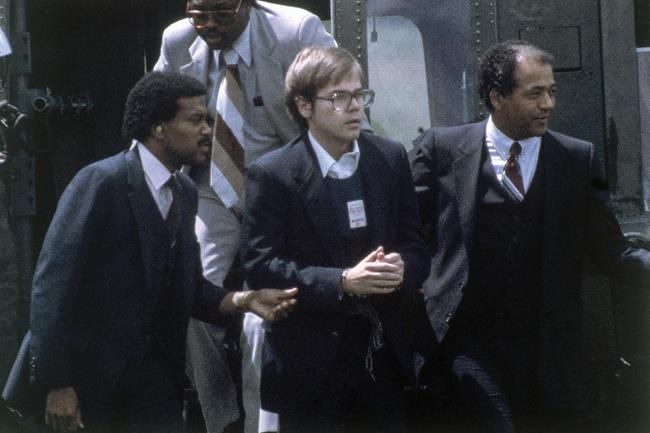NORFOLK, Va. (AP) — John Hinckley Jr., who shot and wounded President Ronald Reagan in 1981, was freed from court oversight Wednesday, officially concluding decades of supervision by legal and mental health professionals.
“After 41 years 2 months and 15 days, FREEDOM AT LAST!!!,” he wrote on Twitter shortly after 12 p.m.
The lifting of all restrictions had been expected since late September. U.S. District Court Judge Paul L. Friedman in Washington had said he would free Hinckley on June 15 if he continued to remain mentally stable in the community in Virginia where he has lived since 2016.
Hinckley, who was acquitted by reason of insanity, spent the decades before that in a Washington mental hospital.
Freedom for Hinckley will include giving a concert — he plays guitar and sings — in Brooklyn, New York, that's scheduled for July. He's already gained nearly 30,000 followers on Twitter and YouTube in recent months as the judge loosened Hinckley's restrictions before fully lifting all of them.
But the graying 67-year-old is far from being the household name that he became after shooting and wounding the 40th U.S. president — and several others — outside a Washington hotel. Today, historians say Hinckley is at best a question on a quiz show and someone who unintentionally helped build the Reagan legend and inspire a push for stricter gun control.
“If Hinckley had succeeded in killing Reagan, then he would have been a pivotal historical figure,” H.W. Brands, a historian and Reagan biographer, wrote in an email to The Associated Press. “As it is, he is a misguided soul whom history has already forgotten.”
Barbara A. Perry, a professor and director of presidential studies at the University of Virginia’s Miller Center, said that Hinckley "would be maybe a Jeopardy question.”
But his impact remains tangible in Reagan's legacy.
“For the president himself to have been so seriously wounded, and to come back from that — that actually made Ronald Reagan the legend that he became ... like the movie hero that he was,” Perry said.
Reagan showed grace and humor in the face of death, Perry said. After being shot, the president told emergency room doctors that he hoped they were all Republicans. He later joked to his wife Nancy that he was sorry he “forgot to duck.”
When the president first spoke to Congress after the shooting, he looked “just a little bit thinner, but he’s still the robust cowboy that is Ronald Reagan,” Perry said.
The assassination attempt paralyzed Reagan press secretary James Brady, who died in 2014.
In 1993, the , which required a five-day waiting period for handgun purchases and background checks of prospective buyers. The Brady Campaign to Prevent Gun Violence and The Brady Center to Prevent Gun Violence are named after Brady and his wife Sarah.
The shooting also injured Secret Service agent Timothy McCarthy and Washington police officer Thomas Delahanty.
McCarthy that he didn’t “have a lot of good Christian thoughts” about Hinckley.
“But in any case, I hope they’re right,” McCarthy, then 72, said of Hinckley's impending release from supervision. “Because the actions of this man could have changed the course of history.”
Hinckley was 25 and suffering from acute psychosis when he shot Reagan and the others. When jurors found him not guilty by reason of insanity, they said he needed treatment and not a lifetime in confinement. He was ordered to live at St. Elizabeths Hospital in Washington.
In the 2000s, Hinckley began making visits to his parents’ home in a gated Williamsburg community. A 2016 court order , albeit under various restrictions, after experts said his mental illness had been in remission for decades.
Hinckley’s mother died in July. He signed a lease on a one-bedroom apartment in the area last year and began living there with his cat, Theo, according to court filings.
Over the years, the court restricted Hinckley from owning a gun or using drugs or alcohol. He also couldn’t contact the actor Jodie Foster, with whom he was obsessed at the time of the shooting, or any of his victims or their families.
One of Reagan’s daughters, Patti Davis, considered the possibility of contact last year.
“There is no manual for how to deal with something like this. … You just have to live with the fear, and the anger, and the darkness that one person keeps bringing into your life,” she wrote.
Stephen J. Morse, a University of Pennsylvania professor of law and psychiatry, means he is not to blame for what happened and he cannot be punished.
"If he hadn’t attempted to kill President Reagan, this guy would have been released ages ago,” Morse said.
Barry Levine, Hinckley's attorney, said in court last year that Hinckley wanted to express his “heartfelt” apologies and “profound regret” to the people he shot and their families as well as to Foster and the American people.
Friedman, the federal judge overseeing Hinckley's case, since the mid-1980s and has exhibited no violent behavior or interest in weapons.
“This is the time to let John Hinckley move on with his life, so we will,” the judge said.
Ben Finley, The Associated Press


